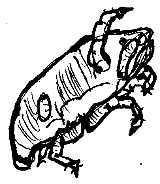From my observations, most Singapore cat owners don't bother to vaccinate their cats or do annual health examination, and so I was surprised to see them. The son used his handphone to take images of my vaccination jab. I checked the medical record. The spayed female cat, born in December 25, 2006 was vaccinated in October 2011 and Sep 2012.
The Ragdoll had a full thick coat. "Any fleas?" I noted no black spots or scales on the skin. "No," the owner said. I turned the cat upside down as part of the physical examination. Earlier I managed to open the mouth slightly as the Ragdoll wanted to claw me in objection. I asked my assistant Naing to give her two halves of a deworming tablet. He gripped the side of the mouth and put in the two halves and then closed the mouth. "Rub on the neck to make the cat swallow," I said. The owners had great difficulty in deworming this cat at home and so I asked Naing to do it to gain some experience in deworming since he was a new graduate.
Some vets will just do it but I usually give the dewormer to the owner to do it at home. Everybody was happy when the cat swallowed. Soon, one half of the tablet popped onto the consultation table. This Ragdoll had outwitted the human being causing laughter amongst the owner. "You get 50/100 for deworming," I said to Naing. Naing repeated again and was successful this time. The reason I had the tablet cut into two halves is to make them easier to swallow. Some 8 years ago, I saw a boarding kennel operator dose a cat with one tablet and the cat choked and died. Many vets give one tablet via the mouth without mishaps but I better not take chances.
I was not expecting any hair loss since the cat looked great. "What are those red circular patches on the groin area?" I asked the owners. "They look like ringworm or some skin irritation from the litter sand."
"The hair loss is due to the cat grooming and licking as the skin is itchy," I said. "How long has these red skin patches been present?"
"This hairless area has been present for some 6 months. The cat grooms it more times."
I switched off the room lighting and asked my assistant to hold the cat upside down with the help of the owners. I asked intern Terrance to come in to see what I would do with Wood's lamp which is used to check for ringworm. Around 30% of the ringworm species will fluoresce green when exposed to the ultra-violet light from the Wood's lamp. If positive, a microscopic examination or fungal culture of the infected hairs can be done.
The teenaged bespectacled daughter did not want to see any feline procedure and looked towards the floor. I asked her to stand up and looked away while I switched on the light. No fluorescence of the hair edges at all. "Only 30% of ringworm will fluoresce," I advised. "I will check under the microscope."
I plucked some hairs at the periphery of the ring-like skin, stuck them on the tape and put the tape onto the slide. I examined the hairs under the microscope. Surprising discovery - I saw moving mites with brown heads and legs.
"I don't want to see," the teenaged daughter protested while her mum and brother saw the mites.
"It is good to acquire more knowledge by seeing the real things affecting your cat." She saw the mites under the microscope and in my illustration.
.
I asked them to bathe the cat with an insecticide but it was difficult to do at home as the cat would have no such nonsense as being wetted.
.
"How about those spot-on insecticide to apply on the skin to kill the mites?" the mum asked.
"Bathing first and then use them," I got the cat bathed in insecticide at the Surgery and prescribed Revolution spot-on insecticide to be used monthly for 3 months.
The cat fur mite, Lynxacarus Radovskyi is said to more common in hot and humid countries. They cling to the hair shafts and grasp them. Hence they are known as hair-clinging or hair-grasping mites. They are seen as black spots and cause itchiness and hair loss in cats.
In this Ragdoll, some months ago, I saw her backside losing hair on both sides, a condition known as bilateral symmetrical alopecia one year ago. This could be due to licking as this fur mite infests the back areas frequently. They are said to cause gingivitis and diarrhoea in some cats. This Ragdoll has gingivitis but overall, the coat does not have the black spots or hair loss except for the groin area. I had not done any skin hair analysis then.
As for today's case, I asked Intern Terrance to take images of the mites as his 2nd project so that he would benefit from being hands on writing clinical research projects rather than standing around to observe the vet. His first video project on the "Lemon Law Affecting New Pets" is still in progress. I had asked him to draw the mites as seen under the microscope but he could not do a good illustration. Some people just can't draw despite me telling him to use circles, squares and rectangles as perspectives. So, I asked him to take images.
 I
am a bit more able
to illustrate as
seen on the left
taken from another
cat with fur mites
seen under the
microscope, in 2003.
This is not as good
as the real images
but that was the
best I could do
without the present
software in my old
microscope. I had
researched on "how
to draw" by reading
such books from the
libraries and so you
can see I have got
the proportions
rights.
I
am a bit more able
to illustrate as
seen on the left
taken from another
cat with fur mites
seen under the
microscope, in 2003.
This is not as good
as the real images
but that was the
best I could do
without the present
software in my old
microscope. I had
researched on "how
to draw" by reading
such books from the
libraries and so you
can see I have got
the proportions
rights. Terrence took some really good images from the software in my microscope. I did the Photo-shopping to produce sharper images for his video. He would be producing a video on the cat fur mites in a Singapore Ragdoll. He works on Sundays whenever he is off from National Service full-time obligations and will be studying veterinary medicine later.
 |
 |
 |
 |
 |
 |
 |
|
 |
<--- my illustration in 2003 from a cat's fur mite. It is known as the hair-clasping mite or hair-clinging mite. My illustration lacked the finer details. It looks like a female mite. | ||
Many Singapore
pet owners just want
an annual
vaccination to save
on costs. It is best
to do a general
physical examination
to screen the health
of the pet and
institute preventive
disease measures.
This will be good
for the pet. "Show
and tell" is a
better form of
client communication
and education to
retain client
loyalty, than just
announcing the
diagnosis. The
images engage the
whole family. It is
more time-consuming
for the vet to do
it, but his staff
may be trained to do
it.
Other article at:
http://www.asiahomes.com/singaporetpvet/1210hair_mites.htm
 TOA
PAYOH VETS
TOA
PAYOH VETS

